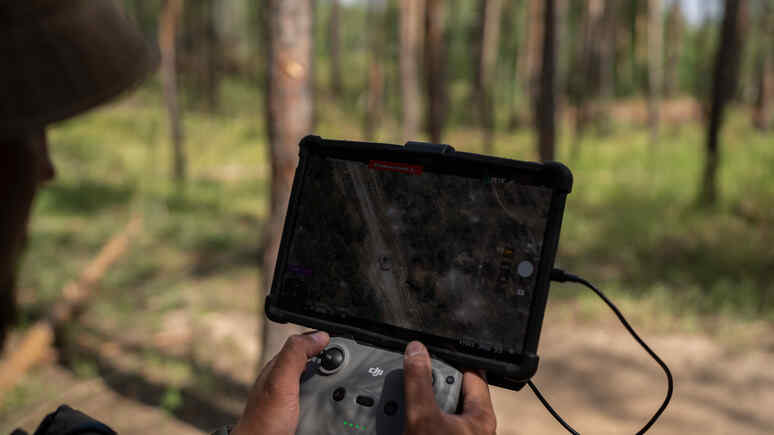Recent conflicts have shown that UAVs have completely changed the methods of warfare. They are now an essential component of modern warfare, Politico states. However, the EU is still lagging far behind in this field. Full-fledged production has not yet been established, and joint EU projects in the field of drones remain very modest.
Drones used to fulfil only a supporting role in military operations. However, recent conflicts have shown that UAVs are now an essential component of modern warfare, Politico says.
Demand for them is growing worldwide, and it’s time for European governments to take notice. It’s time to learn lessons from the armed conflict in Ukraine and the war in Gaza, the publication says.
Drones now have quite a few functions. They provide real-time situational awareness, improve targeting, and help suppress and destroy air and missile defences. Meanwhile, the issue of combating enemy drones to protect one’s infrastructure has also become a hot topic.
One example is the conflict in the Middle East. Hamas used drones to prepare an attack on southern Israel. Israel’s first line of defence – Israel’s high-tech communications, sensor networks and remote-controlled machine guns – was knocked out.
However, according to Politico, sometimes the hype around drones can be exaggerated and misleading. UAVs are not miracle weapons; they should be seen as a means of increasing military effectiveness. They do not operate in isolation, so their effectiveness depends on the performance of the entire military architecture.
The publication conducted a study assessing the impact of drones on military operations. It turned out that UAVs have already become almost indispensable for modern military operations, and their role will only increase in the future.
Therefore, both the EU and NATO need to quickly adapt to modern realities, Politico believes. It is time to include drones and counter-drone technologies in their capability development plan and annual defence review. In parallel, EU countries should start expanding joint defence projects in this area, with a focus on interoperability and the use of advanced technologies.
Of course, drones are nothing new to the Europeans. They featured as early as in the EU’s 2018 Capability Development Plan. Recently, the European Defence Agency also completed a project dedicated to interoperability standards for military drones. This resulted in important recommendations for better integration and interoperability of UAV capabilities.
Nevertheless, the publication recognises that joint EU projects in this field remain very modest, estimated at only a few million euros. Moreover, not all countries are involved. Most of them prefer to prioritise national initiatives, and EU investments in drone and counter-drone technology are still limited.
Moreover, contemporary conflicts demonstrate certain needs that far exceed the standardisation and quality adopted in the EU. For example, NATO has five large, long-endurance high-altitude systems – the NATO Alliance Ground Surveillance System (AGS). The EU, on the other hand, simply does not currently have equivalent capabilities.
Politico states that EU members would do well to have significantly more multirole UAVs and counter-drone capabilities ready to deploy, given the volume of missions outside Europe. In addition, the replicability and affordability of these systems should be prioritised.
Widespread production and modular designs could help bring down the cost of large drones in the near future. However, sensor technologies remain still expensive, so it is worth thinking about increasing specialised self-defence capabilities.
In this regard, projects related to medium and small-sized drones are already underway in the EU. The most ambitious of these, Eurodrone, expects to provide 20 long-endurance multi-purpose UAVs to four countries from 2028 onwards.
There are other interesting projects. Foremost among them are a low-observable tactical unmanned aerial system and next-generation small remotely piloted aircraft.
However, Politico continues, full-fledged production has not yet been established. Most EU countries rely on their fleets of drones. The total number is still limited, but it’s growing, with a particular emphasis on multi-purpose functions. Admittedly, this fragmented approach prevents interoperability and a common framework for doctrine in Europe.
As for counter-drone capabilities, EU achievements and funding appear even more modest in this area, despite being identified as a priority in the latest EU defence review.
According to the publication, the only noteworthy project in this area is a two-year research and design initiative involving 14 countries. It is aimed at building a joint European capability to combat drones, at a cost of €13.5 million.
It is certainly time to reprioritise European countries’ investments in drone warfare. The publication believes it is worth focusing on cost-effective solutions such as electronic warfare and directed energy weapons, including lasers and high-energy microwave weapons.
Politico recognises that despite NATO’s and the EU’s best efforts, they currently do not have enough drones to engage in intense combat with an equal opponent and to deter adversaries or to deal with crisis situations other than conflicts.
In addition, the situation is exacerbated by personnel and training shortfalls, as well as restrictions on intelligence processing and sharing between the EU and allies.
Thus, in the opinion of the publication, EU countries should already unite now and prepare for future drone warfare. This means paying attention to closer co-operation and co-ordination between governments, militaries and industry
The EU should use the upcoming 2024 Coordinated Annual Defence Review to review UAV requirements and counter-UAV capabilities based on current conflicts. Attention and investment in innovation in this area should also be given and expanded, and recruitment and relevant training should be closely addressed.
Only then, Politico believes, will drones play a decisive and successful role in the future of European security.

